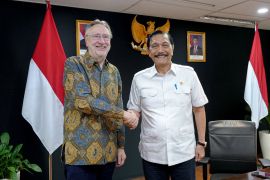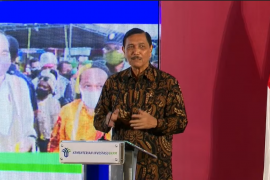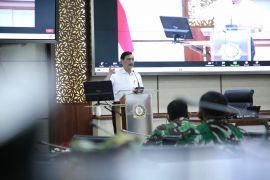At the virtual COVID-19 Coordination Meeting (Rakor) held to discuss precautionary measures amid the development of COVID-19 cases in Greater Jakarta (Jabodetabek), Thursday (Sept 24), attention was drawn to the number of COVID-19 positive cases in DKI Jakarta on September 12-23, 2020, showing a slowing trend. However, in the Bodetabek areas, which are the buffer areas for DKI Jakarta, an increase was still recorded in the past week.
"The activities of DKI Jakarta residents owing to PSBB and then going to a restaurant or cafe in the Bodetabek area, means there is a need to tighten health protocols in Bodetabek to control the spread of COVID-19," Jodi Mahardi, spokesman for the coordinating minister for maritime affairs and investment, noted in a written statement in Jakarta, Friday.
After 10 days of monitoring the development of the COVID-19 virus transmission, Mahardi affirmed that Minister Pandjaitan was seeking a policy synchronization across Jabodetabek to control spread of the virus.
"First, the coordinating minister called for restrictions on people at a place. He appealed to the Indonesian Military (TNI), National Police (Polri), and Public Order Agency (Satpol PP) to always supervise community activities, especially in the presence of crowds," Mahardi expounded.
The government has, until now, monitored community activities at several locations, especially in traditional markets. However, Jodi revealed that Pandjaitan had directed the TNI, Polri, and SatPol PP to focus on clusters in offices, including of ministries and agencies, private companies, and local governments.
"Do not let anyone create a new cluster," Mahardi remarked.
Mahardi noted that Pandjaitan had additionally urged the Ministry of Health to offer test facilities for Satpol PP members conducting health discipline enforcement operations.
Furthermore, Pandjaitan called on the Covid-19 Task Force to promptly offer isolation facilities for Satpol PP, TNI, and Polri members that are asymptomatic or exhibiting mild symptoms.
At the coordination meeting, it was brought to light that based on the DKI Jakarta Health Office’s data, the trend of daily case rates tended to be stable. From August 30 to September 11, a 49-percent increase in the number of active cases was recorded in Jakarta. However, during the period from September 12 to September 23, the increase in active cases dropped to 12 percent.
"Transmission is still increasing but slowing down," DKI Jakarta Governor Anies Baswedan, who attended the virtual coordination meeting, remarked.
Meanwhile, West Java Governor Ridwan Kamil highlighted that by and large, the handling of COVID-19 cases in his area had improved. The positive trend is based on handling from September 14 to September 20, 2020.
"Of the 27 districts and cities, only three areas are included in the red zone, specifically Bekasi City, Karawang District, and Cirebon City. In West Java, (the death rate) was 2.4 percent, and now it is 1.88 percent. The earlier recovery rate reached 53 percent, though now, it has improved to 59 percent, and there has been an improvement in general," he added.
Related news: Public abides by health protocols as exhausted health workers struggle
Related news: Application of family health protocols key to preventing COVID-19
EDITED BY INE
Translator: Ade Irma, Azis Kurmala
Editor: Suharto
Copyright © ANTARA 2020












